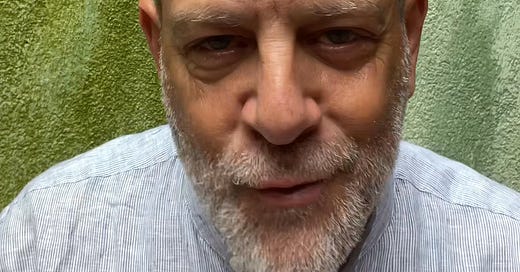Playback speed
×
Share post
Share post at current time
Share from 0:00
0:00
/
0:00
Ezra or Esther? Jewish Choices in the Persian Empire - and today.
Weekly Vid Recap of Below the Bible Belt
May 09, 2025
Conservative or Liberal? Progressive or Traditional? Tribal or global? Is there a both/and?
This isn’t about the new American Pope, but about Ezra, the enigmatic scribe and priest from 2,500 years ago, whose complex legacy rests on binaries. On one hand, he popularized the Bible, building national identity and literacy. On the other, to forge community, he introduced "sacred seed" Judaism based on ethnic-biological lines, dissolving families with foreign-born wives.
Are we for "Family Only"—marrying within our own kind—or for a love that transcends old borders and rules? How does "both/and" function when reality demands sides?
Loyalty vs. love, empathy for all vs. species survival—these big questions arise as this ancient text meets today’s headlines from a fear-fueled war with extremists on both sides.
This week, Below the Bible Belt, we near the end of our 42-month journey through all 24 Hebrew Bible books, with only 3 books and 4 months remaining.
We've just encountered Ezra: national hero? Religious fanatic? Or both?
Ezra arguably shaped the Bible as we know and grapple with it—and his enduring legacy.
The Book of Ezra's 10 chapters hold crucial insights into Jewish origins—not just the story's beginning and the Bible's birth, but also its diverse roots and branches. Multiple narratives and ideologies compete for authority in our sacred texts and today, reflected in widening gaps and polarized politics, especially on Ezra's core concern: tribal vs. global, us vs. them, walls vs. bridges. Ezra favored walls.
The author of Ezra, likely between the 5th and 2nd centuries BCE, had a clear agenda: an ethnic-biological concept of Jewish identity—Jewish by birth, no marriage outside the tribe. Conversion wasn't yet an option. This author also felt strongly about the pre-exilic inhabitants of the Holy Land, choosing conflict over connection.
However, this is only one perspective. Other Jewish voices from that era, in Jerusalem, the Persian capital Shushan, and across the diaspora, lived differently, embodying a contrasting way of being Jewish. Ezra’s focus was Jewish nationalism in the homeland, prohibiting intermarriage. Yet, figures like Queen Esther, Mordechai, and Daniel offer alternatives—assimilation for survival within the Persian palace.
Reading these texts together reveals that the 5th-century BCE divide between diaspora and Zion Jews mirrors today's growing rifts.
In Ezra and other Persian-era books, we see how the victors, led by him, shaped our history, including harsh laws. But we also glimpse the often-hidden or silenced voices that rejected religious extremism. Their potentially more popular stance survived as a minority opinion; they didn't write this book. Ezra did.
Even if Ezra and his followers were pivotal in the Bible's creation, it contains multiple voices, including contemporary prophetic poets in Jerusalem who advocated welcoming the stranger and prioritizing love.
Zechariah, whom we encountered earlier, also moved from Persia to Jerusalem but envisioned a different community: "many nations will attach themselves to our GOD and become God’s people, and God will dwell in your midst."
Zechariah desired universal love; Ezra demanded familial loyalty. Which path? A fusion? We must celebrate our identity without fiercely rejecting others.
Israel's and America's leaderships have leaned towards Ezra's pragmatic, divisive approach. But pendulums swing. Only by hearing all narratives and finding a non-beige middle ground can we achieve a balance where everyone wins.
Ezra and Esther represent contrasting ways of being Jewish and human. Together, their opposing narratives, unearthed and carefully reconstructed, offer a richer, more complete understanding of our origins and why we, their descendants, find ourselves on such different sides today. What still unites and excites us despite these divides? Are we even reading the same book?
These are significant questions as the world continues to surprise us with enduring struggles that demand better future chapters and happier endings. Next week, we conclude Ezra and begin Nehemiah's memoir, hoping to end our biblical journey wiser, kinder, and more aware of our origins, identity, and the better, more loving legacies we can collectively create—with fewer walls and more bridges.
Good luck to the new pope, and happy Mother's Day to all forms of nurturing love in the world.
Thank you for joining me Below the Bible Belt.
Shabbat Shalom.
Recent Posts












Share this post